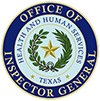OIG Lock-In Program helps fight prescription drug abuse
The Texas health care community plays a critical role in stemming the tide of prescription misuse through participation in the Texas Prescription Monitoring Program (PMP) and the Medicaid Lock-In Program (MLIP). The PMP equips pharmacists and prescribers with information to help prevent the overprescribing and potential misuse of controlled substances.
A recent change in law requires prescribers to check a patient’s PMP history before prescribing opioids, benzodiazepines, barbiturates, and carisoprodol. The Texas Medical Board notes exceptions for patients with cancer or in hospice care. According to the Texas State Board of Pharmacy, pharmacies must report all dispensed controlled substances (Schedule II, III, IV and V) to the PMP within one business day of filling the prescription.
The PMP and the MLIP are resources for medical professionals to identify patients who may need help with substance-use issues. The patient prescription histories collected into a database and monitored by the PMP can identify patients receiving multiple prescriptions from multiple doctors, pointing to evidence of potential doctor-shopping or a misuse of prescription drugs.
Through the MLIP, the Texas Health and Human Services Office of Inspector General (OIG) reviews referrals and data to determine if a person who receives Medicaid benefits meets the criteria for lock-in to a single designated pharmacy and/or prescriber. The patient data reviewed includes diagnoses, acute care services and prescription drug history. Lock-in determinations are based on several factors, including:
- The number of overlapping or duplicative controlled substance prescriptions.
- Using multiple unaffiliated pharmacies and prescribers.
- The number of emergency room visits resulting in opioid prescriptions.
- Treatment that exceeds the daily therapeutic morphine equivalent dose.
An average of 2,398 Medicaid clients were part of the Lock-In Program in fiscal year 2020, resulting in approximately $2.9 million in cost savings to Texas taxpayers. The OIG calculates estimated cost savings by comparing each member’s pharmacy, hospital and emergency room claims before and after lock-in.
If you suspect any misuse of prescriptions, the OIG would like to hear from you. Referrals may come from pharmacists, prescribers, medical providers, managed care organizations, state agencies, law enforcement officials or members of the general public. Candidates for new or continued lock-in may be referred by calling the OIG’s fraud hotline at 800-436-6184 or by clicking the Report Fraud box here on the OIG’s website.

